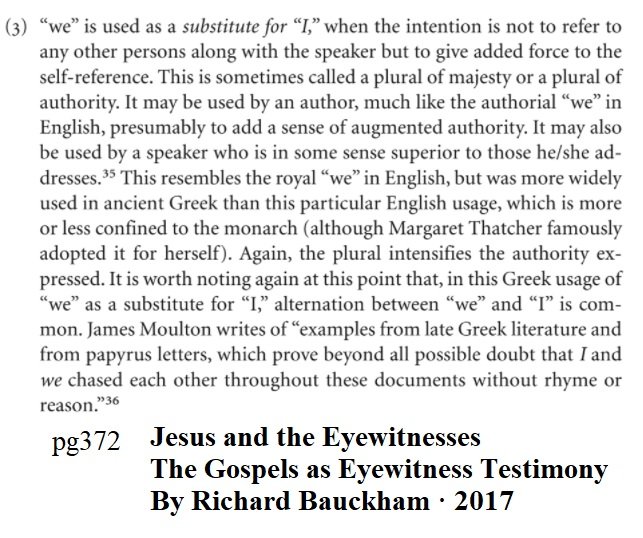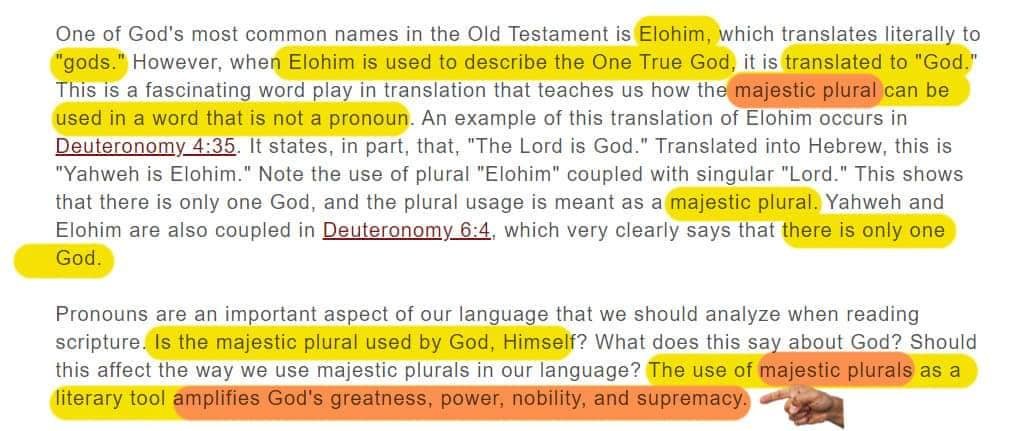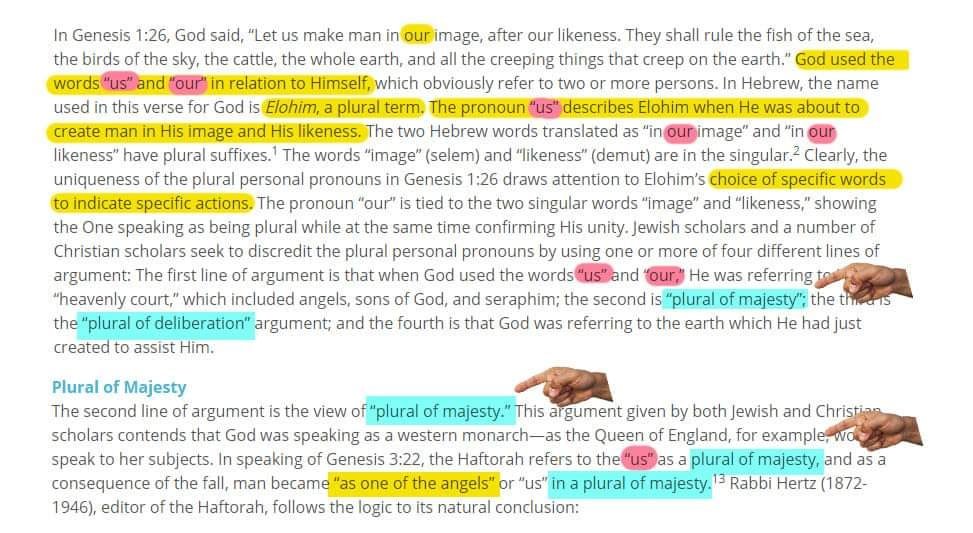𝐓𝐡𝐞 𝐂𝐨𝐧𝐜𝐞𝐩𝐭 𝐨𝐟 “𝐖𝐞” 𝐚𝐬 𝐮𝐬𝐞𝐝 𝐢𝐧 𝐓𝐡𝐞 𝐐𝐮𝐫’𝐚𝐧 𝐛𝐲 𝐀𝐥𝐥𝐚𝐡
Mohamad Mostafa Nassar
Twitter:@NassarMohamadMR

𝐈𝐧 𝐑𝐞𝐟𝐮𝐭𝐚𝐭𝐢𝐨𝐧 𝐨𝐟 𝐭𝐡𝐞 𝐌𝐢𝐬𝐜𝐨𝐧𝐜𝐞𝐩𝐭𝐢𝐨𝐧 𝐭𝐡𝐚𝐭 𝐀𝐥𝐥𝐚𝐡 𝐢𝐬 𝐍𝐨𝐭 𝐎𝐧𝐞 𝐛𝐮𝐭 𝐌𝐚𝐧𝐲
𝐄𝐯𝐞𝐫𝐲𝐨𝐧𝐞 𝐰𝐡𝐨 𝐤𝐧𝐨𝐰𝐬 𝐭𝐡𝐞 𝐀𝐫𝐚𝐛𝐢𝐜 𝐥𝐚𝐧𝐠𝐮𝐚𝐠𝐞 𝐚𝐧𝐝 𝐢𝐭𝐬 𝐬𝐭𝐲𝐥𝐞𝐬 𝐰𝐢𝐥𝐥 𝐤𝐧𝐨𝐰 𝐭𝐡𝐚𝐭 𝐭𝐡𝐞 𝐩𝐫𝐨𝐧𝐨𝐮𝐧 أنا 𝐀𝐧𝐚 (𝐈) 𝐚𝐧𝐝 𝐭𝐡𝐞 𝐟𝐢𝐫𝐬𝐭 𝐩𝐞𝐫𝐬𝐨𝐧 𝐚𝐫𝐞 𝐮𝐬𝐞𝐝 𝐢𝐧 𝐭𝐡𝐞 𝐬𝐢𝐧𝐠𝐮𝐥𝐚𝐫 𝐰𝐡𝐞𝐧 𝐬𝐩𝐞𝐚𝐤𝐢𝐧𝐠 𝐨𝐟 𝐨𝐧𝐞𝐬𝐞𝐥𝐟. 𝐓𝐡𝐞 𝐟𝐢𝐫𝐬𝐭 𝐩𝐞𝐫𝐬𝐨𝐧 𝐩𝐥𝐮𝐫𝐚𝐥 نحن 𝐍𝐚𝐡𝐧𝐮 (𝐰𝐞) 𝐢𝐬 𝐮𝐬𝐞𝐝 𝐭𝐨 𝐫𝐞𝐟𝐞𝐫 𝐭𝐨 𝐭𝐰𝐨 𝐨𝐫 𝐦𝐨𝐫𝐞.
𝐁𝐮𝐭 𝐢𝐭 𝐦𝐚𝐲 𝐛𝐞 𝐮𝐬𝐞𝐝 𝐛𝐲 𝐚𝐧 𝐢𝐧𝐝𝐢𝐯𝐢𝐝𝐮𝐚𝐥 𝐨𝐟 𝐡𝐢𝐠𝐡 𝐬𝐭𝐚𝐧𝐝𝐢𝐧𝐠 𝐚𝐬 𝐚 𝐬𝐢𝐠𝐧 𝐨𝐟 𝐡𝐢𝐬 𝐠𝐫𝐞𝐚𝐭𝐧𝐞𝐬𝐬, 𝐚𝐧𝐝 𝐭𝐡𝐞 𝐜𝐨𝐧𝐭𝐞𝐱𝐭 𝐚𝐧𝐝 𝐜𝐢𝐫𝐜𝐮𝐦𝐬𝐭𝐚𝐧𝐜𝐞𝐬 𝐡𝐞𝐥𝐩 𝐭𝐡𝐞 𝐫𝐞𝐚𝐝𝐞𝐫 𝐨𝐫 𝐥𝐢𝐬𝐭𝐞𝐧𝐞𝐫 𝐭𝐨 𝐮𝐧𝐝𝐞𝐫𝐬𝐭𝐚𝐧𝐝 𝐰𝐡𝐚𝐭 𝐢𝐬 𝐦𝐞𝐚𝐧𝐭.
𝐖𝐡𝐨𝐞𝐯𝐞𝐫 𝐝𝐢𝐬𝐚𝐠𝐫𝐞𝐞𝐬 𝐰𝐢𝐭𝐡 𝐭𝐡𝐚𝐭 𝐢𝐬 𝐞𝐢𝐭𝐡𝐞𝐫 𝐢𝐠𝐧𝐨𝐫𝐚𝐧𝐭 𝐚𝐧𝐝 𝐝𝐨𝐞𝐬 𝐧𝐨𝐭 𝐤𝐧𝐨𝐰 𝐰𝐡𝐚𝐭 𝐡𝐞 𝐢𝐬 𝐭𝐚𝐥𝐤𝐢𝐧𝐠 𝐚𝐛𝐨𝐮𝐭, 𝐨𝐫 𝐡𝐞 𝐢𝐬 𝐬𝐭𝐮𝐛𝐛𝐨𝐫𝐧 𝐚𝐧𝐝 𝐰𝐚𝐧𝐭𝐬 𝐭𝐨 𝐭𝐰𝐢𝐬𝐭 𝐭𝐡𝐞 𝐦𝐞𝐚𝐧𝐢𝐧𝐠 𝐨𝐟 𝐭𝐡𝐞 𝐰𝐨𝐫𝐝𝐬, 𝐟𝐨𝐥𝐥𝐨𝐰𝐢𝐧𝐠 𝐡𝐢𝐬 𝐰𝐡𝐢𝐦𝐬 𝐚𝐧𝐝 𝐝𝐞𝐬𝐢𝐫𝐞𝐬. 𝐁𝐮𝐭 𝐀𝐥𝐥𝐚𝐡 𝐰𝐢𝐥𝐥 𝐞𝐬𝐭𝐚𝐛𝐥𝐢𝐬𝐡 𝐚𝐧𝐝 𝐦𝐚𝐤𝐞 𝐚𝐩𝐩𝐚𝐫𝐞𝐧𝐭 𝐭𝐡𝐞 𝐭𝐫𝐮𝐭𝐡 𝐛𝐲 𝐇𝐢𝐬 𝐖𝐨𝐫𝐝𝐬, 𝐡𝐨𝐰𝐞𝐯𝐞𝐫 𝐦𝐮𝐜𝐡 𝐭𝐡𝐞 𝐬𝐢𝐧𝐧𝐞𝐫𝐬 𝐡𝐚𝐭𝐞 𝐭𝐡𝐚𝐭 [𝐜𝐟. 𝐘𝐨𝐮𝐧𝐮𝐬 𝟏𝟎:𝟖𝟐].
𝐓𝐡𝐞 𝐐𝐮𝐫’𝐚𝐧 𝐰𝐚𝐬 𝐫𝐞𝐯𝐞𝐚𝐥𝐞𝐝 𝐢𝐧 𝐚 𝐩𝐥𝐚𝐢𝐧 𝐀𝐫𝐚𝐛𝐢𝐜 𝐭𝐨𝐧𝐠𝐮𝐞; 𝐨𝐧𝐞 𝐚𝐬𝐩𝐞𝐜𝐭 𝐨𝐟 𝐭𝐡𝐞 𝐥𝐢𝐭𝐞𝐫𝐚𝐫𝐲 𝐬𝐭𝐲𝐥𝐞 𝐨𝐟 𝐭𝐡𝐞 𝐀𝐫𝐚𝐛𝐬 𝐢𝐬 𝐭𝐡𝐚𝐭 𝐭𝐡𝐞 𝐬𝐩𝐞𝐚𝐤𝐞𝐫 𝐦𝐚𝐲 𝐫𝐞𝐟𝐞𝐫 𝐭𝐨 𝐡𝐢𝐦𝐬𝐞𝐥𝐟 𝐬𝐨𝐦𝐞𝐭𝐢𝐦𝐞𝐬 𝐢𝐧 𝐭𝐡𝐞 𝐟𝐢𝐫𝐬𝐭 𝐩𝐞𝐫𝐬𝐨𝐧, 𝐬𝐨𝐦𝐞𝐭𝐢𝐦𝐞𝐬 𝐢𝐧 𝐭𝐡𝐞 𝐭𝐡𝐢𝐫𝐝 𝐩𝐞𝐫𝐬𝐨𝐧, 𝐬𝐨𝐦𝐞𝐭𝐢𝐦𝐞𝐬 𝐢𝐧 𝐭𝐡𝐞 𝐬𝐢𝐧𝐠𝐮𝐥𝐚𝐫 𝐚𝐧𝐝 𝐬𝐨𝐦𝐞𝐭𝐢𝐦𝐞𝐬 𝐢𝐧 𝐭𝐡𝐞 𝐩𝐥𝐮𝐫𝐚𝐥. 𝐓𝐡𝐢𝐬 𝐯𝐚𝐫𝐢𝐚𝐭𝐢𝐨𝐧 𝐢𝐬 𝐩𝐚𝐫𝐭 𝐨𝐟 𝐞𝐥𝐨𝐪𝐮𝐞𝐧𝐜𝐞 𝐚𝐧𝐝 𝐠𝐨𝐨𝐝 𝐬𝐭𝐲𝐥𝐞.
𝐍𝐨 𝐨𝐧𝐞 𝐜𝐚𝐧 𝐮𝐧𝐝𝐞𝐫𝐬𝐭𝐚𝐧𝐝 𝐭𝐡𝐢𝐬 𝐞𝐱𝐜𝐞𝐩𝐭 𝐭𝐡𝐨𝐬𝐞 𝐰𝐡𝐨 𝐤𝐧𝐨𝐰 𝐀𝐫𝐚𝐛𝐢𝐜 𝐚𝐧𝐝 𝐡𝐚𝐯𝐞 𝐚 𝐬𝐮𝐟𝐟𝐢𝐜𝐢𝐞𝐧𝐭 𝐠𝐫𝐚𝐬𝐩 𝐨𝐟 𝐢𝐭𝐬 𝐝𝐢𝐟𝐟𝐞𝐫𝐞𝐧𝐭 𝐰𝐚𝐲𝐬 𝐨𝐟 𝐞𝐱𝐩𝐫𝐞𝐬𝐬𝐢𝐨𝐧.
𝐈𝐭 𝐢𝐬 𝐚 𝐟𝐞𝐚𝐭𝐮𝐫𝐞 𝐨𝐟 𝐥𝐢𝐭𝐞𝐫𝐚𝐫𝐲 𝐬𝐭𝐲𝐥𝐞 𝐢𝐧 𝐀𝐫𝐚𝐛𝐢𝐜 𝐭𝐡𝐚𝐭 𝐚 𝐩𝐞𝐫𝐬𝐨𝐧 𝐦𝐚𝐲 𝐫𝐞𝐟𝐞𝐫 𝐭𝐨 𝐡𝐢𝐦𝐬𝐞𝐥𝐟 𝐛𝐲 𝐭𝐡𝐞 𝐩𝐫𝐨𝐧𝐨𝐮𝐧 𝐧𝐚𝐡𝐧𝐮 (𝐰𝐞) 𝐟𝐨𝐫 𝐫𝐞𝐬𝐩𝐞𝐜𝐭 𝐨𝐫 𝐠𝐥𝐨𝐫𝐢𝐟𝐢𝐜𝐚𝐭𝐢𝐨𝐧. 𝐇𝐞 𝐦𝐚𝐲 𝐚𝐥𝐬𝐨 𝐮𝐬𝐞 𝐭𝐡𝐞 𝐰𝐨𝐫𝐝 𝐚𝐧𝐚 (𝐈), 𝐢𝐧𝐝𝐢𝐜𝐚𝐭𝐢𝐧𝐠 𝐨𝐧𝐞 𝐩𝐞𝐫𝐬𝐨𝐧, 𝐨𝐫 𝐭𝐡𝐞 𝐭𝐡𝐢𝐫𝐝 𝐩𝐞𝐫𝐬𝐨𝐧 𝐡𝐮𝐰𝐚 (𝐡𝐞).
𝐀𝐥𝐥 𝐭𝐡𝐫𝐞𝐞 𝐬𝐭𝐲𝐥𝐞𝐬 𝐚𝐫𝐞 𝐮𝐬𝐞𝐝 𝐢𝐧 𝐭𝐡𝐞 𝐐𝐮𝐫’𝐚𝐧, 𝐰𝐡𝐞𝐫𝐞 𝐀𝐥𝐥𝐚𝐡 𝐚𝐝𝐝𝐫𝐞𝐬𝐬𝐞𝐬 𝐭𝐡𝐞 𝐀𝐫𝐚𝐛𝐬 𝐢𝐧 𝐭𝐡𝐞𝐢𝐫 𝐨𝐰𝐧 𝐭𝐨𝐧𝐠𝐮𝐞.
(𝐅𝐚𝐭𝐚̄𝐰𝐚́ 𝐚𝐥-𝐋𝐚𝐣𝐧𝐚𝐡 𝐚𝐥-𝐃𝐚𝐚’𝐢𝐦𝐚𝐡, 𝟒/𝟏𝟒𝟑).
“𝐀𝐥𝐥𝐚𝐡, 𝐦𝐚𝐲 𝐇𝐞 𝐛𝐞 𝐠𝐥𝐨𝐫𝐢𝐟𝐢𝐞𝐝 𝐚𝐧𝐝 𝐞𝐱𝐚𝐥𝐭𝐞𝐝, 𝐬𝐨𝐦𝐞𝐭𝐢𝐦𝐞𝐬 𝐫𝐞𝐟𝐞𝐫𝐬 𝐭𝐨 𝐇𝐢𝐦𝐬𝐞𝐥𝐟 𝐢𝐧 𝐭𝐡𝐞 𝐬𝐢𝐧𝐠𝐮𝐥𝐚𝐫, 𝐛𝐲 𝐧𝐚𝐦𝐞 𝐨𝐫 𝐛𝐲 𝐮𝐬𝐞 𝐨𝐟 𝐚 𝐩𝐫𝐨𝐧𝐨𝐮𝐧, 𝐚𝐧𝐝 𝐬𝐨𝐦𝐞𝐭𝐢𝐦𝐞𝐬 𝐛𝐲 𝐮𝐬𝐞 𝐨𝐟 𝐭𝐡𝐞 𝐩𝐥𝐮𝐫𝐚𝐥, 𝐚𝐬 𝐢𝐧 𝐭𝐡𝐞 𝐩𝐡𝐫𝐚𝐬𝐞: ‘𝐕𝐞𝐫𝐢𝐥𝐲, 𝐰𝐞 𝐡𝐚𝐯𝐞 𝐠𝐢𝐯𝐞𝐧 𝐲𝐨𝐮 𝐚 𝐦𝐚𝐧𝐢𝐟𝐞𝐬𝐭 𝐯𝐢𝐜𝐭𝐨𝐫𝐲” [𝐚𝐥-𝐅𝐚𝐭𝐡 𝟒𝟖:𝟏], 𝐚𝐧𝐝 𝐨𝐭𝐡𝐞𝐫 𝐬𝐢𝐦𝐢𝐥𝐚𝐫 𝐩𝐡𝐫𝐚𝐬𝐞𝐬.
𝐁𝐮𝐭 𝐀𝐥𝐥𝐚𝐡 𝐧𝐞𝐯𝐞𝐫 𝐫𝐞𝐟𝐞𝐫𝐬 𝐭𝐨 𝐇𝐢𝐦𝐬𝐞𝐥𝐟 𝐛𝐲 𝐮𝐬𝐞 𝐨𝐟 𝐭𝐡𝐞 𝐝𝐮𝐚𝐥, 𝐛𝐞𝐜𝐚𝐮𝐬𝐞 𝐭𝐡𝐞 𝐩𝐥𝐮𝐫𝐚𝐥 𝐫𝐞𝐟𝐞𝐫𝐬 𝐭𝐨 𝐭𝐡𝐞 𝐫𝐞𝐬𝐩𝐞𝐜𝐭 𝐭𝐡𝐚𝐭 𝐇𝐞 𝐝𝐞𝐬𝐞𝐫𝐯𝐞𝐬, 𝐚𝐧𝐝 𝐦𝐚𝐲 𝐫𝐞𝐟𝐞𝐫 𝐭𝐨 𝐇𝐢𝐬 𝐧𝐚𝐦𝐞𝐬 𝐚𝐧𝐝 𝐚𝐭𝐭𝐫𝐢𝐛𝐮𝐭𝐞𝐬, 𝐰𝐡𝐞𝐫𝐞𝐚𝐬 𝐭𝐡𝐞 𝐝𝐮𝐚𝐥 𝐫𝐞𝐟𝐞𝐫𝐬 𝐭𝐨 𝐚 𝐬𝐩𝐞𝐜𝐢𝐟𝐢𝐜 𝐧𝐮𝐦𝐛𝐞𝐫 (𝐚𝐧𝐝 𝐧𝐨𝐭𝐡𝐢𝐧𝐠 𝐞𝐥𝐬𝐞), 𝐚𝐧𝐝 𝐇𝐞 𝐢𝐬 𝐟𝐚𝐫 𝐚𝐛𝐨𝐯𝐞 𝐭𝐡𝐚𝐭.”
(𝐀𝐥-‘𝐀𝐪𝐞𝐞𝐝𝐚𝐡 𝐚𝐥-𝐓𝐚𝐝𝐦𝐮𝐫𝐢𝐲𝐲𝐚𝐡 𝐛𝐲 𝐒𝐡𝐚𝐲𝐤𝐡 𝐚𝐥-𝐈𝐬𝐥𝐚𝐦 𝐈𝐛𝐧 𝐓𝐚𝐲𝐦𝐢𝐲𝐚𝐡, 𝐩. 𝟕𝟓).
𝐓𝐡𝐞𝐬𝐞 𝐰𝐨𝐫𝐝𝐬, 𝐢𝐧𝐧𝐚𝐚 (“𝐕𝐞𝐫𝐢𝐥𝐲 𝐖𝐞”) 𝐚𝐧𝐝 𝐧𝐚𝐡𝐧𝐮 (“𝐖𝐞”), 𝐚𝐧𝐝 𝐨𝐭𝐡𝐞𝐫 𝐟𝐨𝐫𝐦𝐬 𝐨𝐟 𝐭𝐡𝐞 𝐩𝐥𝐮𝐫𝐚𝐥, 𝐦𝐚𝐲 𝐛𝐞 𝐮𝐬𝐞𝐝 𝐛𝐲 𝐨𝐧𝐞 𝐩𝐞𝐫𝐬𝐨𝐧 𝐬𝐩𝐞𝐚𝐤𝐢𝐧𝐠 𝐨𝐧 𝐛𝐞𝐡𝐚𝐥𝐟 𝐨𝐟 𝐚 𝐠𝐫𝐨𝐮𝐩, 𝐨𝐫 𝐭𝐡𝐞𝐲 𝐦𝐚𝐲 𝐛𝐞 𝐮𝐬𝐞𝐝 𝐛𝐲 𝐨𝐧𝐞 𝐩𝐞𝐫𝐬𝐨𝐧 𝐟𝐨𝐫 𝐩𝐮𝐫𝐩𝐨𝐬𝐞𝐬 𝐨𝐟 𝐫𝐞𝐬𝐩𝐞𝐜𝐭 𝐨𝐫 𝐠𝐥𝐨𝐫𝐢𝐟𝐢𝐜𝐚𝐭𝐢𝐨𝐧, 𝐚𝐬 𝐢𝐬 𝐝𝐨𝐧𝐞 𝐛𝐲 𝐬𝐨𝐦𝐞 𝐦𝐨𝐧𝐚𝐫𝐜𝐡𝐬 𝐰𝐡𝐞𝐧 𝐭𝐡𝐞𝐲 𝐢𝐬𝐬𝐮𝐞 𝐬𝐭𝐚𝐭𝐞𝐦𝐞𝐧𝐭𝐬 𝐨𝐫 𝐝𝐞𝐜𝐫𝐞𝐞𝐬 𝐢𝐧 𝐰𝐡𝐢𝐜𝐡 𝐭𝐡𝐞𝐲 𝐬𝐚𝐲 “𝐖𝐞 𝐡𝐚𝐯𝐞 𝐝𝐞𝐜𝐢𝐝𝐞𝐝…” 𝐞𝐭𝐜.
[𝐓𝐡𝐢𝐬 𝐢𝐬 𝐤𝐧𝐨𝐰𝐧 𝐢𝐧 𝐄𝐧𝐠𝐥𝐢𝐬𝐡 𝐚𝐬 “𝐓𝐡𝐞 𝐑𝐨𝐲𝐚𝐥 𝐖𝐞”]. 𝐈𝐧 𝐬𝐮𝐜𝐡 𝐜𝐚𝐬𝐞𝐬, 𝐨𝐧𝐥𝐲 𝐨𝐧𝐞 𝐩𝐞𝐫𝐬𝐨𝐧 𝐢𝐬 𝐬𝐩𝐞𝐚𝐤𝐢𝐧𝐠 𝐛𝐮𝐭 𝐭𝐡𝐞 𝐩𝐥𝐮𝐫𝐚𝐥 𝐢𝐬 𝐮𝐬𝐞𝐝 𝐟𝐨𝐫 𝐫𝐞𝐬𝐩𝐞𝐜𝐭.
𝐓𝐡𝐞 𝐎𝐧𝐞 𝐖𝐡𝐨 𝐢𝐬 𝐦𝐨𝐫𝐞 𝐝𝐞𝐬𝐞𝐫𝐯𝐢𝐧𝐠 𝐨𝐟 𝐫𝐞𝐬𝐩𝐞𝐜𝐭 𝐭𝐡𝐚𝐧 𝐚𝐧𝐲 𝐨𝐭𝐡𝐞𝐫 𝐢𝐬 𝐀𝐥𝐥𝐚𝐡, 𝐦𝐚𝐲 𝐇𝐞 𝐛𝐞 𝐠𝐥𝐨𝐫𝐢𝐟𝐢𝐞𝐝 𝐚𝐧𝐝 𝐞𝐱𝐚𝐥𝐭𝐞𝐝, 𝐬𝐨 𝐰𝐡𝐞𝐧 𝐇𝐞 𝐬𝐚𝐲𝐬 𝐢𝐧 𝐭𝐡𝐞 𝐐𝐮𝐫’𝐚𝐧 𝐢𝐧𝐧𝐚𝐚 (“𝐕𝐞𝐫𝐢𝐥𝐲 𝐖𝐞”) 𝐚𝐧𝐝 𝐧𝐚𝐡𝐧𝐮 (“𝐖𝐞”), 𝐢𝐭 𝐢𝐬 𝐟𝐨𝐫 𝐫𝐞𝐬𝐩𝐞𝐜𝐭 𝐚𝐧𝐝 𝐠𝐥𝐨𝐫𝐢𝐟𝐢𝐜𝐚𝐭𝐢𝐨𝐧, 𝐧𝐨𝐭 𝐭𝐨 𝐢𝐧𝐝𝐢𝐜𝐚𝐭𝐞 𝐚 𝐩𝐥𝐮𝐫𝐚𝐥𝐢𝐭𝐲 𝐨𝐟 𝐧𝐮𝐦𝐛𝐞𝐫𝐬.
𝐈𝐟 𝐚𝐧 𝐚𝐚𝐲𝐚𝐡=𝐯𝐞𝐫𝐬𝐞 𝐨𝐟 𝐭𝐡𝐢𝐬 𝐭𝐲𝐩𝐞 𝐢𝐬 𝐜𝐚𝐮𝐬𝐢𝐧𝐠 𝐜𝐨𝐧𝐟𝐮𝐬𝐢𝐨𝐧, 𝐢𝐭 𝐢𝐬 𝐞𝐬𝐬𝐞𝐧𝐭𝐢𝐚𝐥 𝐭𝐨 𝐫𝐞𝐟𝐞𝐫 𝐭𝐨 𝐭𝐡𝐞 𝐜𝐥𝐞𝐚𝐫, 𝐮𝐧𝐚𝐦𝐛𝐢𝐠𝐮𝐨𝐮𝐬 𝐚𝐚𝐲𝐚𝐚𝐭=𝐯𝐞𝐫𝐬𝐞𝐬 𝐟𝐨𝐫 𝐜𝐥𝐚𝐫𝐢𝐟𝐢𝐜𝐚𝐭𝐢𝐨𝐧, 𝐚𝐧𝐝 𝐢𝐟 𝐚 𝐂𝐡𝐫𝐢𝐬𝐭𝐢𝐚𝐧, 𝐟𝐨𝐫 𝐞𝐱𝐚𝐦𝐩𝐥𝐞, 𝐢𝐧𝐬𝐢𝐬𝐭𝐬 𝐨𝐧 𝐭𝐚𝐤𝐢𝐧𝐠 𝐚𝐲𝐚𝐚𝐭=𝐯𝐞𝐫𝐬𝐞𝐬 𝐬𝐮𝐜𝐡 𝐚𝐬 “𝐕𝐞𝐫𝐢𝐥𝐲, 𝐖𝐞: 𝐢𝐭 𝐢𝐬 𝐖𝐞 𝐖𝐡𝐨 𝐡𝐚𝐯𝐞 𝐬𝐞𝐧𝐭 𝐝𝐨𝐰𝐧 𝐭𝐡𝐞 𝐃𝐡𝐢𝐤𝐫 (𝐢.𝐞., 𝐭𝐡𝐞 𝐐𝐮𝐫’𝐚𝐧)” [𝐚𝐥-𝐇𝐢𝐣𝐫 𝟏𝟓:𝟗 – 𝐚𝐬 𝐩𝐫𝐨𝐨𝐟 𝐨𝐟 𝐝𝐢𝐯𝐢𝐧𝐞 𝐩𝐥𝐮𝐫𝐚𝐥𝐢𝐭𝐲, 𝐰𝐞 𝐦𝐚𝐲 𝐫𝐞𝐟𝐮𝐭𝐞 𝐭𝐡𝐢𝐬 𝐜𝐥𝐚𝐢𝐦 𝐛𝐲 𝐪𝐮𝐨𝐭𝐢𝐧𝐠 𝐬𝐮𝐜𝐡 𝐜𝐥𝐞𝐚𝐫 𝐚𝐧𝐝 𝐮𝐧𝐚𝐦𝐛𝐢𝐠𝐮𝐨𝐮𝐬 𝐚𝐚𝐲𝐚𝐚𝐭=𝐯𝐞𝐫𝐬𝐞𝐬 𝐚𝐬:
“𝐀𝐧𝐝 𝐲𝐨𝐮𝐫 𝐠𝐨𝐝 𝐢𝐬 𝐎𝐧𝐞 𝐆𝐨𝐝, 𝐭𝐡𝐞𝐫𝐞 𝐢𝐬 𝐧𝐨𝐧𝐞 𝐰𝐡𝐨 𝐡𝐚𝐬 𝐭𝐡𝐞 𝐫𝐢𝐠𝐡𝐭 𝐭𝐨 𝐛𝐞 𝐰𝐨𝐫𝐬𝐡𝐢𝐩𝐩𝐞𝐝 𝐛𝐮𝐭 𝐇𝐞, 𝐭𝐡𝐞 𝐌𝐨𝐬𝐭 𝐁𝐞𝐧𝐞𝐟𝐢𝐜𝐞𝐧𝐭, 𝐭𝐡𝐞 𝐌𝐨𝐬𝐭 𝐌𝐞𝐫𝐜𝐢𝐟𝐮𝐥” [𝐚𝐥-𝐁𝐚𝐪𝐚𝐫𝐚𝐡 𝟐:𝟏𝟔𝟑] 𝐚𝐧𝐝 “𝐒𝐚𝐲: 𝐇𝐞 𝐢𝐬 𝐀𝐥𝐥𝐚𝐡, 𝐭𝐡𝐞 𝐎𝐧𝐞” [𝐚𝐥-𝐈𝐤𝐡𝐥𝐚𝐚𝐬 𝟏𝟏𝟐:𝟏] – 𝐚𝐧𝐝 𝐨𝐭𝐡𝐞𝐫 𝐚𝐚𝐲𝐚𝐚𝐭=𝐯𝐞𝐫𝐬𝐞𝐬 𝐰𝐡𝐢𝐜𝐡 𝐜𝐚𝐧 𝐨𝐧𝐥𝐲 𝐛𝐞 𝐢𝐧𝐭𝐞𝐫𝐩𝐫𝐞𝐭𝐞𝐝 𝐢𝐧 𝐨𝐧𝐞 𝐰𝐚𝐲. 𝐓𝐡𝐮𝐬, 𝐜𝐨𝐧𝐟𝐮𝐬𝐢𝐨𝐧 𝐰𝐢𝐥𝐥 𝐛𝐞 𝐝𝐢𝐬𝐩𝐞𝐥𝐥𝐞𝐝 𝐟𝐨𝐫 𝐭𝐡𝐞 𝐨𝐧𝐞 𝐰𝐡𝐨 𝐢𝐬 𝐬𝐞𝐞𝐤𝐢𝐧𝐠 𝐭𝐡𝐞 𝐭𝐫𝐮𝐭𝐡.
𝐄𝐯𝐞𝐫𝐲 𝐭𝐢𝐦𝐞 𝐀𝐥𝐥𝐚𝐡 𝐮𝐬𝐞𝐬 𝐭𝐡𝐞 𝐩𝐥𝐮𝐫𝐚𝐥 𝐭𝐨 𝐫𝐞𝐟𝐞𝐫 𝐭𝐨 𝐇𝐢𝐦𝐬𝐞𝐥𝐟, 𝐢𝐭 𝐢𝐬 𝐛𝐚𝐬𝐞𝐝 𝐨𝐧 𝐭𝐡𝐞 𝐫𝐞𝐬𝐩𝐞𝐜𝐭 𝐚𝐧𝐝 𝐡𝐨𝐧𝐨𝐮𝐫 𝐭𝐡𝐚𝐭 𝐇𝐞 𝐝𝐞𝐬𝐞𝐫𝐯𝐞𝐬, 𝐚𝐧𝐝 𝐨𝐧 𝐭𝐡𝐞 𝐠𝐫𝐞𝐚𝐭 𝐧𝐮𝐦𝐛𝐞𝐫 𝐨𝐟 𝐇𝐢𝐬 𝐧𝐚𝐦𝐞𝐬 𝐚𝐧𝐝 𝐚𝐭𝐭𝐫𝐢𝐛𝐮𝐭𝐞𝐬, 𝐚𝐧𝐝 𝐨𝐧 𝐭𝐡𝐞 𝐠𝐫𝐞𝐚𝐭 𝐧𝐮𝐦𝐛𝐞𝐫 𝐨𝐟 𝐇𝐢𝐬 𝐭𝐫𝐨𝐨𝐩𝐬 𝐚𝐧𝐝 𝐚𝐧𝐠𝐞𝐥𝐬.”
(𝐑𝐞𝐟𝐞𝐫𝐞𝐧𝐜𝐞: 𝐀𝐥-‘𝐀𝐪𝐞𝐞𝐝𝐚𝐡 𝐚𝐥-𝐓𝐚𝐝𝐦𝐮𝐫𝐢𝐲𝐲𝐚𝐡 𝐛𝐲 𝐒𝐡𝐚𝐲𝐤𝐡 𝐚𝐥-𝐈𝐬𝐥𝐚𝐦 𝐈𝐛𝐧 𝐓𝐚𝐲𝐦𝐢𝐲𝐚𝐡, 𝐩. 𝟏𝟎𝟗).
𝐓𝐡𝐞 𝐐𝐮𝐫’𝐚𝐧 𝐰𝐚𝐬 𝐧𝐨𝐭 𝐫𝐞𝐯𝐞𝐚𝐥𝐞𝐝 𝐢𝐧 𝐨𝐧𝐥𝐲 𝐨𝐧𝐞 𝐬𝐭𝐲𝐥𝐞; 𝐫𝐚𝐭𝐡𝐞𝐫 𝐢𝐭 𝐮𝐬𝐞𝐬 𝐚 𝐯𝐚𝐫𝐢𝐞𝐭𝐲 𝐨𝐟 𝐝𝐢𝐟𝐟𝐞𝐫𝐞𝐧𝐭 𝐬𝐭𝐲𝐥𝐞𝐬; 𝐭𝐡𝐢𝐬 𝐢𝐬 𝐩𝐚𝐫𝐭 𝐨𝐟 𝐢𝐭𝐬 𝐦𝐢𝐫𝐚𝐜𝐮𝐥𝐨𝐮𝐬 𝐧𝐚𝐭𝐮𝐫𝐞 𝐚𝐧𝐝 𝐞𝐥𝐨𝐪𝐮𝐞𝐧𝐜𝐞.
𝐃𝐫 ‘𝐀𝐛𝐝 𝐚𝐥-𝐌𝐮𝐡𝐬𝐢𝐧 𝐚𝐥-𝐌𝐮𝐭𝐚𝐲𝐫𝐢 𝐬𝐚𝐲𝐬 𝐢𝐧 𝐡𝐢𝐬 𝐛𝐨𝐨𝐤 𝐃𝐚‘𝐚𝐚𝐰𝐚 𝐚𝐥-𝐓𝐚𝐚‘𝐢𝐧𝐞𝐞𝐧𝐚 𝐟𝐢’𝐥-𝐐𝐮𝐫’𝐚𝐧 𝐚𝐥-𝐊𝐚𝐫𝐞𝐞𝐦 (𝐩. 𝟑𝟎𝟒): 𝐎𝐧𝐞 𝐨𝐟 𝐭𝐡𝐞 𝐥𝐢𝐭𝐞𝐫𝐚𝐫𝐲 𝐬𝐭𝐲𝐥𝐞𝐬 𝐨𝐟 𝐭𝐡𝐞 𝐀𝐫𝐚𝐛𝐬 𝐢𝐬 𝐟𝐨𝐫 𝐭𝐡𝐞 𝐬𝐩𝐞𝐚𝐤𝐞𝐫 𝐭𝐨 𝐫𝐞𝐟𝐞𝐫 𝐭𝐨 𝐡𝐢𝐦𝐬𝐞𝐥𝐟 𝐢𝐧 𝐭𝐡𝐞 𝐟𝐢𝐫𝐬𝐭 𝐩𝐞𝐫𝐬𝐨𝐧 𝐚𝐧𝐝 𝐢𝐧 𝐭𝐡𝐞 𝐭𝐡𝐢𝐫𝐝 𝐩𝐞𝐫𝐬𝐨𝐧. 𝐅𝐨𝐫 𝐞𝐱𝐚𝐦𝐩𝐥𝐞, 𝐚 𝐬𝐩𝐞𝐚𝐤𝐞𝐫 𝐦𝐚𝐲 𝐬𝐚𝐲, “𝐈 𝐝𝐢𝐝 𝐬𝐮𝐜𝐡 𝐚𝐧𝐝 𝐬𝐮𝐜𝐡; 𝐈 𝐰𝐞𝐧𝐭.
𝐈 𝐢𝐧𝐬𝐭𝐫𝐮𝐜𝐭 𝐲𝐨𝐮, 𝐎 𝐒𝐨 𝐚𝐧𝐝 𝐬𝐨, 𝐭𝐨 𝐝𝐨 𝐬𝐮𝐜𝐡 𝐚𝐧𝐝 𝐬𝐮𝐜𝐡.” 𝐀𝐧𝐝 𝐬𝐨𝐦𝐞𝐭𝐢𝐦𝐞𝐬 𝐡𝐞 𝐦𝐚𝐲 𝐚𝐥𝐬𝐨 𝐬𝐚𝐲 𝐨𝐟 𝐡𝐢𝐦𝐬𝐞𝐥𝐟 𝐭𝐡𝐚𝐭 “𝐒𝐨 𝐚𝐧𝐝 𝐬𝐨 – 𝐦𝐞𝐚𝐧𝐢𝐧𝐠 𝐡𝐢𝐦𝐬𝐞𝐥𝐟 – 𝐢𝐧𝐬𝐭𝐫𝐮𝐜𝐭𝐬 𝐲𝐨𝐮 𝐭𝐨 𝐝𝐨 𝐬𝐮𝐜𝐡 𝐚𝐧𝐝 𝐬𝐮𝐜𝐡 𝐚𝐧𝐝 𝐟𝐨𝐫𝐛𝐢𝐝𝐬 𝐲𝐨𝐮 𝐭𝐨 𝐝𝐨 𝐬𝐮𝐜𝐡 𝐚𝐧𝐝 𝐬𝐮𝐜𝐡; 𝐨𝐫 𝐡𝐞 𝐥𝐢𝐤𝐞𝐬 𝐲𝐨𝐮 𝐭𝐨 𝐝𝐨 𝐬𝐮𝐜𝐡 𝐚𝐧𝐝 𝐬𝐮𝐜𝐡.”
𝐓𝐡𝐢𝐬 𝐢𝐬 𝐥𝐢𝐤𝐞 𝐰𝐡𝐞𝐧 𝐚𝐧 𝐚𝐦𝐞𝐞𝐫 (𝐫𝐮𝐥𝐞𝐫) 𝐨𝐫 𝐤𝐢𝐧𝐠 𝐬𝐚𝐲𝐬 𝐭𝐨 𝐡𝐢𝐬 𝐩𝐞𝐨𝐩𝐥𝐞: “𝐓𝐡𝐞 𝐀𝐦𝐞𝐞𝐫 𝐚𝐬𝐤𝐬 𝐲𝐨𝐮 𝐭𝐨 𝐝𝐨 𝐬𝐮𝐜𝐡 𝐚𝐧𝐝 𝐬𝐮𝐜𝐡.” 𝐖𝐡𝐚𝐭 𝐡𝐞 𝐢𝐬 𝐭𝐫𝐲𝐢𝐧𝐠 𝐭𝐨 𝐞𝐦𝐩𝐡𝐚𝐬𝐢𝐬𝐞 𝐢𝐬 𝐭𝐡𝐚𝐭 𝐡𝐢𝐬 𝐢𝐧𝐬𝐭𝐫𝐮𝐜𝐭𝐢𝐨𝐧𝐬 𝐚𝐫𝐞 𝐛𝐚𝐬𝐞𝐝 𝐨𝐧 𝐭𝐡𝐞 𝐟𝐚𝐜𝐭 𝐭𝐡𝐚𝐭 𝐡𝐞 𝐢𝐬 𝐚 𝐫𝐮𝐥𝐞𝐫 𝐨𝐫 𝐤𝐢𝐧𝐠; 𝐭𝐡𝐢𝐬 𝐢𝐬 𝐦𝐨𝐫𝐞 𝐞𝐥𝐨𝐪𝐮𝐞𝐧𝐭 𝐭𝐡𝐚𝐧 𝐬𝐚𝐲𝐢𝐧𝐠 𝐭𝐨 𝐭𝐡𝐞𝐦, “𝐈 𝐚𝐦 𝐭𝐡𝐞 𝐤𝐢𝐧𝐠, 𝐚𝐧𝐝 𝐈 𝐚𝐦 𝐭𝐞𝐥𝐥𝐢𝐧𝐠 𝐲𝐨𝐮 𝐭𝐨 𝐝𝐨 𝐬𝐮𝐜𝐡 𝐚𝐧𝐝 𝐬𝐮𝐜𝐡.” 𝐒𝐚𝐲𝐢𝐧𝐠 “𝐓𝐡𝐞 𝐤𝐢𝐧𝐠 𝐢𝐧𝐬𝐭𝐫𝐮𝐜𝐭𝐬 𝐲𝐨𝐮…” 𝐢𝐬 𝐦𝐨𝐫𝐞 𝐞𝐥𝐨𝐪𝐮𝐞𝐧𝐭 𝐭𝐡𝐚𝐧 𝐬𝐚𝐲𝐢𝐧𝐠 “𝐈 𝐚𝐦 𝐭𝐡𝐞 𝐤𝐢𝐧𝐠, 𝐚𝐧𝐝 𝐈 𝐚𝐦 𝐢𝐧𝐬𝐭𝐫𝐮𝐜𝐭𝐢𝐧𝐠 𝐲𝐨𝐮…”
𝐓𝐡𝐢𝐬 𝐤𝐢𝐧𝐝 𝐨𝐟 𝐬𝐭𝐲𝐥𝐞 𝐚𝐥𝐬𝐨 𝐚𝐩𝐩𝐞𝐚𝐫𝐬 𝐢𝐧 𝐭𝐡𝐞 𝐐𝐮𝐫’𝐚𝐧. 𝐓𝐡𝐞 𝐨𝐧𝐞 𝐰𝐡𝐨 𝐝𝐨𝐞𝐬 𝐧𝐨𝐭 𝐤𝐧𝐨𝐰 𝐀𝐫𝐚𝐛𝐢𝐜 𝐦𝐚𝐲 𝐭𝐡𝐢𝐧𝐤 𝐭𝐡𝐚𝐭 𝐀𝐥𝐥𝐚𝐡 𝐜𝐚𝐧𝐧𝐨𝐭 𝐬𝐩𝐞𝐚𝐤 𝐨𝐟 𝐇𝐢𝐦𝐬𝐞𝐥𝐟 𝐢𝐧 𝐭𝐡𝐞 𝐭𝐡𝐢𝐫𝐝 𝐩𝐞𝐫𝐬𝐨𝐧, 𝐚𝐧𝐝 𝐭𝐡𝐚𝐭 𝐇𝐞 𝐦𝐮𝐬𝐭 𝐬𝐚𝐲 “𝐈 𝐡𝐚𝐯𝐞 𝐬𝐞𝐧𝐭 𝐝𝐨𝐰𝐧 𝐭𝐨 𝐲𝐨𝐮, 𝐎 𝐌𝐮𝐡𝐚𝐦𝐦𝐚𝐝, 𝐭𝐡𝐞 𝐁𝐨𝐨𝐤 𝐰𝐢𝐭𝐡 𝐭𝐫𝐮𝐭𝐡, 𝐜𝐨𝐧𝐟𝐢𝐫𝐦𝐢𝐧𝐠 𝐰𝐡𝐚𝐭 𝐜𝐚𝐦𝐞 𝐛𝐞𝐟𝐨𝐫𝐞 𝐢𝐭” 𝐚𝐧𝐝 𝐭𝐡𝐞 𝐥𝐢𝐤𝐞. 𝐁𝐮𝐭 𝐭𝐡𝐢𝐬 𝐫𝐞𝐟𝐥𝐞𝐜𝐭𝐬 𝐢𝐠𝐧𝐨𝐫𝐚𝐧𝐜𝐞 𝐨𝐟 𝐭𝐡𝐞 𝐥𝐢𝐭𝐞𝐫𝐚𝐫𝐲 𝐬𝐭𝐲𝐥𝐞 𝐢𝐧 𝐀𝐫𝐚𝐛𝐢𝐜 𝐚𝐧𝐝 𝐡𝐨𝐰 𝐢𝐭 𝐢𝐬 𝐩𝐚𝐫𝐭 𝐨𝐟 𝐀𝐫𝐚𝐛𝐢𝐜 𝐞𝐥𝐨𝐪𝐮𝐞𝐧𝐜𝐞.
𝐔𝐧𝐝𝐨𝐮𝐛𝐭𝐞𝐝𝐥𝐲 𝐟𝐨𝐫 𝐀𝐥𝐥𝐚𝐡 𝐭𝐨 𝐬𝐩𝐞𝐚𝐤 𝐨𝐟 𝐇𝐢𝐦𝐬𝐞𝐥𝐟 𝐢𝐧 𝐭𝐡𝐞 𝐭𝐡𝐢𝐫𝐝 𝐩𝐞𝐫𝐬𝐨𝐧 𝐢𝐬 𝐦𝐨𝐫𝐞 𝐞𝐥𝐨𝐪𝐮𝐞𝐧𝐭 𝐭𝐡𝐚𝐧 𝐬𝐚𝐲𝐢𝐧𝐠 “𝐀𝐥𝐢𝐟-𝐋𝐚𝐚𝐦-𝐌𝐞𝐞𝐦, 𝐈 𝐚𝐦 𝐀𝐥𝐥𝐚𝐡, 𝐭𝐡𝐞𝐫𝐞 𝐢𝐬 𝐧𝐨 𝐠𝐨𝐝 𝐛𝐮𝐭 𝐈, 𝐭𝐡𝐞 𝐄𝐯𝐞𝐫 𝐋𝐢𝐯𝐢𝐧𝐠, 𝐭𝐡𝐞 𝐎𝐧𝐞 𝐖𝐡𝐨 𝐬𝐮𝐬𝐭𝐚𝐢𝐧𝐬 𝐚𝐧𝐝 𝐩𝐫𝐨𝐭𝐞𝐜𝐭𝐬 𝐚𝐥𝐥 𝐭𝐡𝐚𝐭 𝐞𝐱𝐢𝐬𝐭𝐬. 𝐈 𝐬𝐞𝐧𝐭 𝐝𝐨𝐰𝐧 𝐭𝐨 𝐲𝐨𝐮 𝐭𝐡𝐞 𝐁𝐨𝐨𝐤 𝐰𝐢𝐭𝐡 𝐭𝐫𝐮𝐭𝐡, 𝐜𝐨𝐧𝐟𝐢𝐫𝐦𝐢𝐧𝐠 𝐰𝐡𝐚𝐭 𝐜𝐚𝐦𝐞 𝐛𝐞𝐟𝐨𝐫𝐞 𝐢𝐭…” (𝐜𝐟. 𝐀𝐚𝐥 ‘𝐈𝐦𝐫𝐚𝐧 𝟑:𝟏-𝟑).
(𝐄𝐧𝐝 𝐪𝐮𝐨𝐭𝐞)
𝐈𝐭 𝐢𝐬 𝐤𝐧𝐨𝐰𝐧 𝐟𝐫𝐨𝐦 𝐀𝐫𝐚𝐛 𝐥𝐢𝐭𝐞𝐫𝐚𝐫𝐲 𝐜𝐮𝐬𝐭𝐨𝐦 𝐭𝐡𝐚𝐭 𝐭𝐡𝐞𝐲 𝐝𝐨 𝐧𝐨𝐭 𝐩𝐞𝐫𝐬𝐢𝐬𝐭 𝐢𝐧 𝐨𝐧𝐞 𝐬𝐭𝐲𝐥𝐞 𝐢𝐧 𝐭𝐡𝐞𝐢𝐫 𝐬𝐩𝐞𝐞𝐜𝐡; 𝐫𝐚𝐭𝐡𝐞𝐫 𝐭𝐡𝐞𝐲 𝐦𝐨𝐯𝐞 𝐟𝐫𝐨𝐦 𝐨𝐧𝐞 𝐬𝐭𝐲𝐥𝐞 𝐭𝐨 𝐚𝐧𝐨𝐭𝐡𝐞𝐫, 𝐞𝐯𝐞𝐧 𝐢𝐧 𝐚 𝐬𝐢𝐧𝐠𝐥𝐞 𝐩𝐚𝐬𝐬𝐚𝐠𝐞, 𝐥𝐞𝐭 𝐚𝐥𝐨𝐧𝐞 𝐰𝐡𝐞𝐧 𝐭𝐡𝐞𝐫𝐞 𝐚𝐫𝐞 𝐭𝐰𝐨 𝐝𝐢𝐟𝐟𝐞𝐫𝐞𝐧𝐭 𝐩𝐚𝐬𝐬𝐚𝐠𝐞𝐬 (𝐨𝐧 𝐭𝐰𝐨 𝐝𝐢𝐟𝐟𝐞𝐫𝐞𝐧𝐭 𝐨𝐜𝐜𝐚𝐬𝐢𝐨𝐧𝐬).

𝐓𝐡𝐢𝐬 𝐢𝐬 𝐩𝐚𝐫𝐭 𝐨𝐟 𝐭𝐡𝐞 𝐀𝐫𝐚𝐛𝐢𝐜 𝐥𝐢𝐭𝐞𝐫𝐚𝐫𝐲 𝐬𝐭𝐲𝐥𝐞 𝐭𝐡𝐚𝐭 𝐬𝐞𝐫𝐯𝐞𝐬 𝐭𝐨 𝐤𝐞𝐞𝐩 𝐭𝐡𝐞 𝐥𝐢𝐬𝐭𝐞𝐧𝐞𝐫’𝐬 𝐨𝐫 𝐫𝐞𝐚𝐝𝐞𝐫’𝐬 𝐚𝐭𝐭𝐞𝐧𝐭𝐢𝐨𝐧.
𝐀𝐳-𝐙𝐚𝐫𝐤𝐚𝐬𝐡𝐢 (𝐦𝐚𝐲 𝐀𝐥𝐥𝐚𝐡 𝐡𝐚𝐯𝐞 𝐦𝐞𝐫𝐜𝐲 𝐨𝐧 𝐡𝐢𝐦) 𝐬𝐚𝐢𝐝:
𝐌𝐨𝐯𝐢𝐧𝐠 𝐟𝐫𝐨𝐦 𝐨𝐧𝐞 𝐬𝐭𝐲𝐥𝐞 𝐭𝐨 𝐚𝐧𝐨𝐭𝐡𝐞𝐫 𝐬𝐞𝐫𝐯𝐞𝐬 𝐭𝐨 𝐦𝐚𝐤𝐞 𝐬𝐩𝐞𝐞𝐜𝐡 𝐟𝐥𝐨𝐰 𝐦𝐨𝐫𝐞 𝐬𝐦𝐨𝐨𝐭𝐡𝐥𝐲, 𝐡𝐞𝐥𝐩𝐬 𝐭𝐡𝐞 𝐥𝐢𝐬𝐭𝐞𝐧𝐞𝐫 𝐭𝐨 𝐟𝐨𝐜𝐮𝐬, 𝐫𝐞𝐧𝐞𝐰𝐬 𝐡𝐢𝐬 𝐢𝐧𝐭𝐞𝐫𝐞𝐬𝐭 𝐚𝐧𝐝 𝐚𝐯𝐨𝐢𝐝𝐬 𝐭𝐡𝐞 𝐛𝐨𝐫𝐞𝐝𝐨𝐦 𝐭𝐡𝐚𝐭 𝐦𝐚𝐲 𝐫𝐞𝐬𝐮𝐥𝐭 𝐟𝐫𝐨𝐦 𝐚𝐥𝐰𝐚𝐲𝐬 𝐚𝐝𝐡𝐞𝐫𝐢𝐧𝐠 𝐭𝐨 𝐨𝐧𝐞 𝐬𝐭𝐲𝐥𝐞.
𝐇𝐚𝐚𝐳𝐢𝐦 𝐬𝐚𝐢𝐝 𝐢𝐧 𝐌𝐢𝐧𝐡𝐚𝐚𝐣 𝐚𝐥-𝐁𝐮𝐥𝐚𝐠𝐡𝐚’: 𝐓𝐡𝐞𝐲 𝐛𝐞𝐜𝐨𝐦𝐞 𝐛𝐨𝐫𝐞𝐝 𝐰𝐡𝐞𝐧 𝐭𝐡𝐞 𝐬𝐭𝐲𝐥𝐞 𝐩𝐞𝐫𝐬𝐢𝐬𝐭𝐬 𝐢𝐧 𝐮𝐬𝐢𝐧𝐠 𝐭𝐡𝐞 𝐟𝐢𝐫𝐬𝐭 𝐩𝐞𝐫𝐬𝐨𝐧 𝐨𝐫 𝐭𝐡𝐞 𝐬𝐞𝐜𝐨𝐧𝐝 𝐩𝐞𝐫𝐬𝐨𝐧, 𝐬𝐨 𝐭𝐡𝐞𝐲 𝐦𝐨𝐯𝐞 𝐟𝐫𝐨𝐦 𝐭𝐡𝐞 𝐬𝐞𝐜𝐨𝐧𝐝 𝐩𝐞𝐫𝐬𝐨𝐧 𝐭𝐨 𝐭𝐡𝐞 𝐭𝐡𝐢𝐫𝐝 𝐩𝐞𝐫𝐬𝐨𝐧. 𝐁𝐲 𝐭𝐡𝐞 𝐬𝐚𝐦𝐞 𝐭𝐨𝐤𝐞𝐧, 𝐚 𝐬𝐩𝐞𝐚𝐤𝐞𝐫 𝐦𝐚𝐲 𝐜𝐡𝐚𝐧𝐠𝐞 𝐭𝐡𝐞 𝐩𝐫𝐨𝐧𝐨𝐮𝐧 𝐚𝐧𝐝 𝐩𝐥𝐚𝐲 𝐰𝐢𝐭𝐡 𝐭𝐡𝐞 𝐰𝐨𝐫𝐝𝐬, 𝐬𝐨𝐦𝐞𝐭𝐢𝐦𝐞𝐬 𝐮𝐬𝐢𝐧𝐠 𝐭𝐡𝐞 𝐟𝐢𝐫𝐬𝐭 𝐩𝐞𝐫𝐬𝐨𝐧 𝐭𝐨 𝐬𝐩𝐞𝐚𝐤 𝐨𝐟 𝐡𝐢𝐦𝐬𝐞𝐥𝐟, 𝐚𝐧𝐝 𝐬𝐨𝐦𝐞𝐭𝐢𝐦𝐞𝐬 𝐮𝐬𝐢𝐧𝐠 𝐭𝐡𝐞 𝐬𝐞𝐜𝐨𝐧𝐝 𝐩𝐞𝐫𝐬𝐨𝐧 𝐨𝐫 𝐭𝐡𝐢𝐫𝐝 𝐩𝐞𝐫𝐬𝐨𝐧.
𝐇𝐞𝐧𝐜𝐞 𝐬𝐩𝐞𝐞𝐜𝐡 𝐭𝐡𝐚𝐭 𝐩𝐞𝐫𝐬𝐢𝐬𝐭𝐬 𝐢𝐧 𝐮𝐬𝐢𝐧𝐠 𝐚 𝐩𝐚𝐫𝐭𝐢𝐜𝐮𝐥𝐚𝐫 𝐩𝐫𝐨𝐧𝐨𝐮𝐧, 𝐰𝐡𝐞𝐭𝐡𝐞𝐫 𝐢𝐭 𝐢𝐬 𝐭𝐡𝐞 𝐟𝐢𝐫𝐬𝐭 𝐨𝐫 𝐬𝐞𝐜𝐨𝐧𝐝 𝐩𝐞𝐫𝐬𝐨𝐧, 𝐢𝐬 𝐧𝐨𝐭 𝐫𝐞𝐠𝐚𝐫𝐝𝐞𝐝 𝐚𝐬 𝐠𝐨𝐨𝐝; 𝐫𝐚𝐭𝐡𝐞𝐫 𝐢𝐭 𝐢𝐬 𝐦𝐨𝐫𝐞 𝐚𝐩𝐩𝐫𝐨𝐩𝐫𝐢𝐚𝐭𝐞 𝐭𝐨 𝐦𝐨𝐯𝐞 𝐟𝐫𝐨𝐦 𝐨𝐧𝐞 𝐭𝐨 𝐭𝐡𝐞 𝐨𝐭𝐡𝐞𝐫.
𝐓𝐡𝐞𝐧 𝐚𝐳-𝐙𝐚𝐫𝐤𝐚𝐬𝐡𝐢 (𝐦𝐚𝐲 𝐀𝐥𝐥𝐚𝐡 𝐡𝐚𝐯𝐞 𝐦𝐞𝐫𝐜𝐲 𝐨𝐧 𝐡𝐢𝐦) 𝐠𝐢𝐯𝐞𝐬 𝐝𝐢𝐟𝐟𝐞𝐫𝐞𝐧𝐭 𝐞𝐱𝐚𝐦𝐩𝐥𝐞𝐬 𝐨𝐟 𝐬𝐮𝐜𝐡 𝐮𝐬𝐚𝐠𝐞 𝐚𝐧𝐝 𝐭𝐡𝐞𝐢𝐫 𝐞𝐟𝐟𝐞𝐜𝐭𝐢𝐯𝐞𝐧𝐞𝐬𝐬 𝐢𝐧 𝐜𝐨𝐧𝐯𝐞𝐲𝐢𝐧𝐠 𝐭𝐡𝐞 𝐦𝐞𝐬𝐬𝐚𝐠𝐞.
𝐒𝐞𝐞: 𝐚𝐥-𝐁𝐮𝐫𝐡𝐚𝐚𝐧 𝐟𝐢 ‘𝐔𝐥𝐨𝐨𝐦 𝐚𝐥-𝐐𝐮𝐫’𝐚𝐧 𝐛𝐲 𝐁𝐚𝐝𝐫 𝐚𝐝-𝐃𝐞𝐞𝐧 𝐚𝐳-𝐙𝐚𝐫𝐤𝐚𝐬𝐡𝐢, 𝟑/𝟑𝟏𝟒-𝟑𝟑𝟎
𝐈𝐧 𝐜𝐚𝐬𝐞 𝐭𝐡𝐞 𝐂𝐡𝐫𝐢𝐬𝐭𝐢𝐚𝐧𝐬 𝐚𝐭𝐭𝐚𝐜𝐤 𝐈𝐬𝐥𝐚𝐦 𝐚𝐛𝐨𝐮𝐭 𝐭𝐡𝐞 “𝐑𝐨𝐲𝐚𝐥 𝐖𝐞” (𝐖𝐞, 𝐔𝐬, 𝐎𝐮𝐫) 𝐢𝐧 𝐓𝐡𝐞 𝐆𝐥𝐨𝐫𝐢𝐨𝐮𝐬 𝐇𝐨𝐥𝐲 𝐐𝐮𝐫𝐚𝐧. 𝐑𝐨𝐲𝐚𝐥 𝐖𝐞 (𝐌𝐚𝐣𝐞𝐬𝐭𝐢𝐜 𝐏𝐥𝐮𝐫𝐚𝐥) 𝐚𝐥𝐬𝐨 𝐞𝐱𝐢𝐬𝐭 𝐢𝐧 𝐭𝐡𝐞𝐢𝐫 𝐁𝐢𝐛𝐥𝐞.




𝐀𝐥𝐥𝐚𝐡 𝐤𝐧𝐨𝐰𝐬 𝐁𝐞𝐬𝐭.
𝐑𝐞𝐟𝐞𝐫𝐞𝐧𝐜𝐞𝐬:
Why Do We Refer to God Using the Masculine Pronoun?
The use of the plural “We” by God in the Quran- The Majestic We
God using the plural for Himself
Why Quran uses masculine pronouns (He/Him/His) for Allah?
𝐒𝐨𝐮𝐫𝐜𝐞: 𝐘𝐚𝐪𝐮𝐛𝐚 𝐍𝐮𝐫𝐢 𝐀𝐦𝐢𝐧